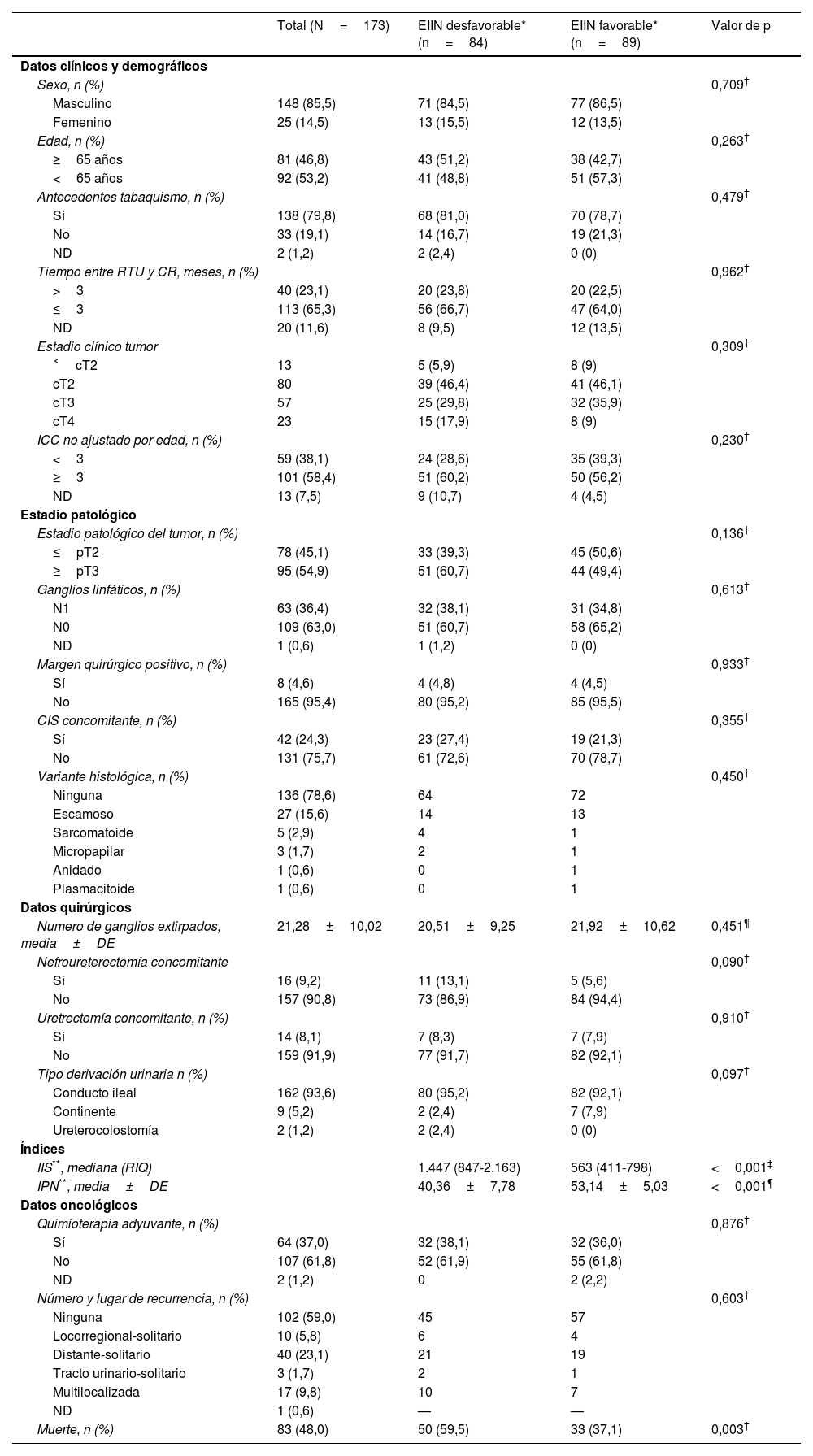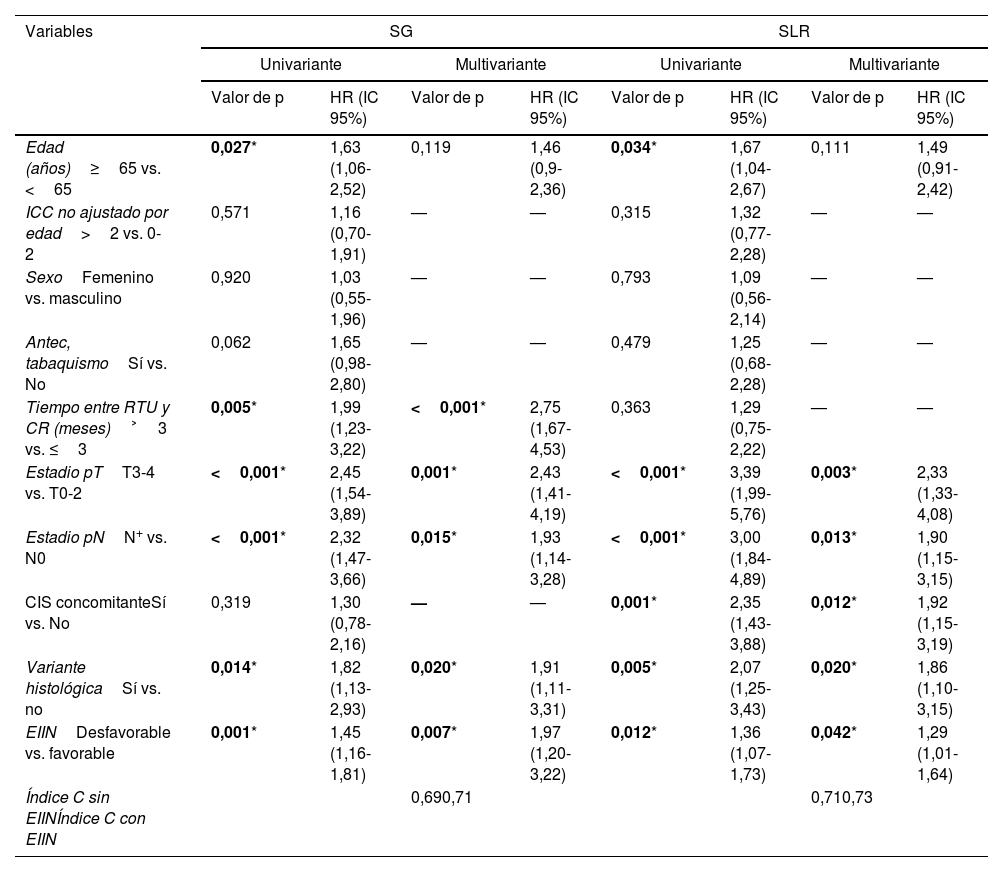Evaluar por primera vez el papel del estado inmunológico-inflamatorio-nutricional (EIIN) en los resultados oncológicos de pacientes sometidos a cistectomía radical abierta (CRA) por carcinoma urotelial (CU).
Materiales y métodosSe analizaron retrospectivamente los registros de pacientes consecutivos sometidos a CRA por cáncer de vejiga no metastásico entre los años 2009 y 2020. La quimioterapia neoadyuvante, el tumor no urotelial y la ausencia de seguimiento oncológico fueron criterios de exclusión. Se calcularon los valores del índice de inmunidad-inflamación sistémica (IIS) y del índice pronóstico nutricional (IPN) y se utilizaron los valores de corte óptimos para estos, con el fin de designar cuatro subgrupos: «IIS alto-IPN alto», «IIS bajo-IPN alto», «IIS bajo-IPN bajo» y «IIS alto-IPN bajo». El grupo de EIIN con IIS bajo-IPN alto tuvo la mejor tasa de supervivencia global (SG), mientras que el resto se incluyó en el grupo de EIIN desfavorable. Se elaboraron curvas de supervivencia y se utilizó un modelo de regresión de Cox multivariante para la SG y la supervivencia libre de recidiva (SLR).
ResultadosTras aplicar los criterios de exclusión, el tamaño final de la cohorte fue de 173 pacientes. La edad media fue de 64,31±8,35 y la mediana de seguimiento fue de 21 (RIQ: 9-58) meses. Los valores de corte óptimos para IIS y IPN fueron 1.216 y 47, respectivamente. El grupo de EIIN favorable (IIS bajo-IPN alto, n=89) tuvo la mejor tasa de SG (62,9%). El análisis multivariante de regresión de Cox indicó que el EIIN desfavorable (n=84) era un factor independiente de pronóstico para una SG peor (HR: 1,509; IC 95%: 1,104-3,145; p=0,001) y la SLR (HR: 1,285; IC 95%: 1,009-1,636; p=0,042).
ConclusiónLa evaluación preoperatoria del EIIN puede constituir un panel útil para el pronóstico de la SG y la SLR en pacientes sometidos a CRA por CU.
To perform the first investigation of the role of immune-inflammatory-nutritional status (INS) on oncological outcomes in patients undergoing open radical cystectomy (ORC) for urothelial carcinoma (UC).
Materials and methodsThe records of consecutive patients who underwent ORC for non-metastatic bladder cancer between 2009 and 2020 were retrospectively analyzed. Neoadjuvant chemotherapy, non-urothelial tumor biology, and absence of oncological follow-up were exclusion criteria. Systemic immune-inflammatory index (SII) and prognostic nutritional index (PNI) values were calculated and optimal cut-off values for these were used to designate four subgroups: «high SII-high PNI», «low SII-high PNI», «low SII-low PNI», and «high SII-low PNI». The low SII-high PNI INS group had best overall survival (OS) rate while the remainder were included in non-favorable INS group. Survival curves were constructed, and a multivariate Cox regression model was used for OS and recurrence-free survival (RFS).
ResultsAfter exclusions, the final cohort size was 173 patients. The mean age was 64.31±8.35 and median follow-up was 21 (IQR: 9-58) months. Optimal cut-off values for SII and PNI were 1216 and 47, respectively. The favorable INS group (low SII-high PNI, n=89) had the best OS rate (62.9%). Multivariate Cox regression analysis indicated that non-favorable INS (n=84) was a worse independent prognostic factor for OS (HR: 1.509, 95% CI: 1.104-3.145, P=.001) and RFS (HR: 1.285; 95% CI: 1.009-1.636, P=.042).
ConclusionPreoperative assessment of INS may be a useful prognostic panel for OS and RFS in patients who had ORC for UC.















